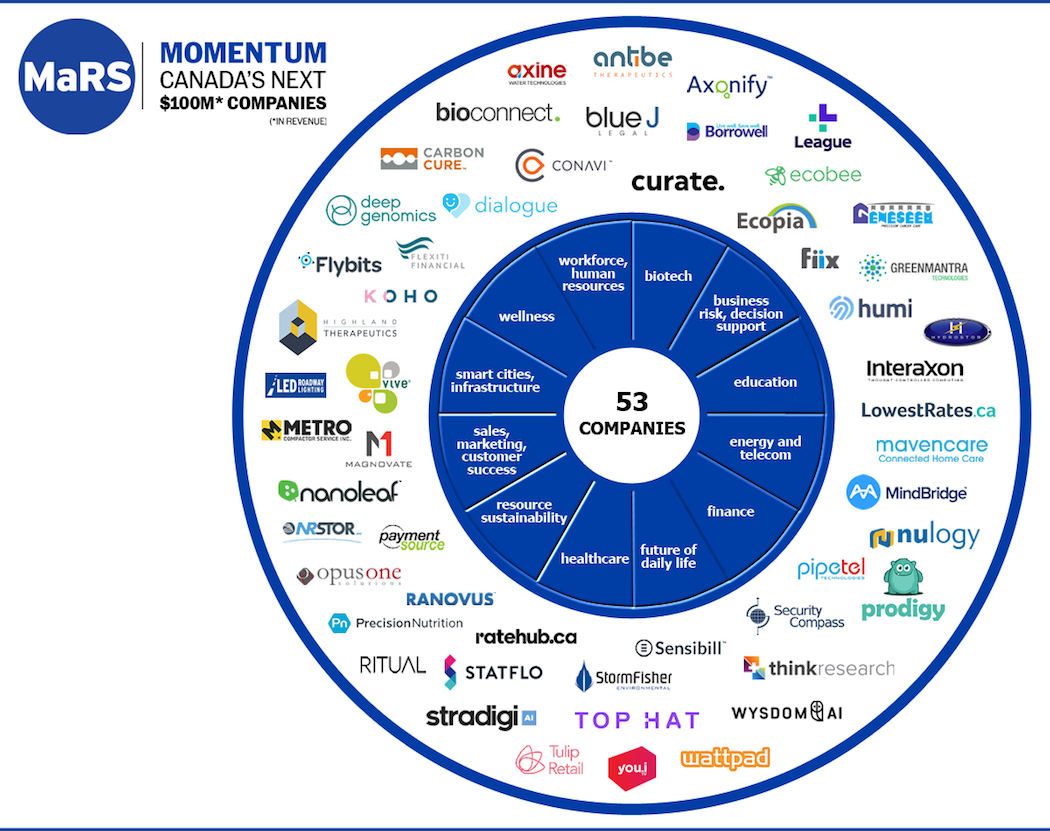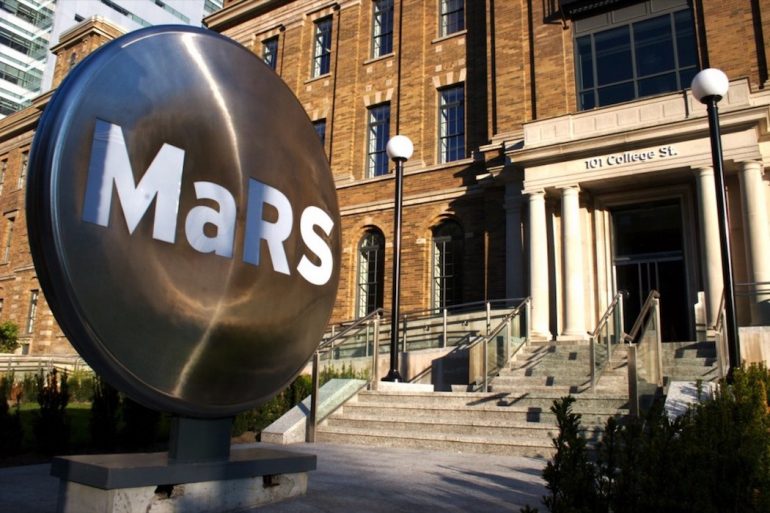MaRS Discovery District has officially launched Momentum, a new program designed to support high-growth Canadian companies with the potential to reach $100 million in revenue in the next five years. Although Momentum was created last year, it is officially being launched now, and MaRS is announcing the 53 companies in the program’s “portfolio.”
MaRS estimated the companies could reach $7.9 billion in revenue after five years with a 20 percent annual growth rate.
Momentum was established with part of the $17.5 million MaRS received from the federal government through its Scale-Up Platform, in April 2019. Communitech, MaRS, and Invest Ottawa received a cumulative $52.4 million investment to implement the Scale-Up Platform to help grow later-stage companies. While each hub built out its own plan for how the funding would be used, they are working together to implement their Scale-Up programs.
When Scale-Up Platform funding was first announced last year, Prime Minister Justin Trudeau said the new initiative would create 18,000 jobs and $11 billion in revenue, as well as attract $4 billion in investment. The federal government funding for Scale-Up was provided through FedDev Ontario, the regional development agency for southern Ontario.
Krista Jones, founding executive of Momentum at MaRS, told BetaKit the Momentum program originated the same time the federal Scale-Up Platform was announced. She noted that during its conversations about Scale-Up with the federal government, MaRS wanted to keep with the initiative’s goal of creating “anchor firms” for the country’s innovation ecosystem.
RELATED: Impact Centre’s 2019 Narwhal List shows Canadian tech struggling to produce unicorns
During the announcement last year, FedDev Ontario characterized anchor firms as companies with more than $100 million in revenue that drive innovation, business expansion, intellectual property, and job creation.
Jones explained that accelerators in Canada have been successful in getting startups over “Series A hump,” but that MaRS viewed the next step as helping companies to anchor a long-term position for Ontario and Canada in the global startup ecosystem. The gaps MaRS identified for potential anchor firms included securing executive talent, a lack of knowledge on the commercial aspects of scaling, and a lack of experience in going global.
“If you look at any reports coming out, we’re still not graduating enough Shopify’s or OpenText’s, or we’re not getting enough companies to remain Canadian-headquartered, deep science and technology companies,” Jones told BetaKit. “So when we looked around the ecosystem, we thought we [needed] to focus on this next step in getting companies developed so that we could close that final loop.”
Intended to be a five-year program, Momentum will primarily provide guidance and advice on accessing capital, talent, and global markets, as well as building stronger partnerships with post-secondary institutions. The program does not offer capital to companies, nor does it take equity from them.
Jones declined to comment on how much MaRS or other partners have committed to the Momentum program, but she noted that the program’s funding would be used to bring on partners as well as “executives in residence” to assist companies in gaining market traction.
RELATED: MaRS’ Yung Wu: “we have days, not weeks and months” to preserve innovation sector
When the $52.4 million federal investment was announced last year, the three hubs were also mandated with ensuring that innovation centres in smaller communities in Ontario would receive access to scale-up programming, advisory services, and support. Programs such as Velocity, Waterloo Accelerator Centre, and even Carleton University have received support through their respective innovation hubs. It is unclear how much of the $17.5 million MaRS received is going towards Momentum.
Some of the companies within Momentum’s “portfolio” include MindBridge AI, which acquired Brevis Limited, an accountancy technology firm based in the United Kingdom earlier this year. FinTech startup Borrowell, which closed a $20 million Series B round last year, is also within the Momentum portfolio. Other companies include Top Hat, Deep Genomics, Koho, Ritual, Wattpad, and Stradigi AI. According to MaRS, the current companies earn a combined sum of $905 million in revenue.

MaRS estimated that more than 20 companies in its program are likely to surpass the $100 million annual revenue mark in five years. Jones said MaRS opted to use revenue as a benchmark rather than company valuation as a valuation can be “too subjective, depending on the industry.”
“We thought that when you get to $100 million in revenue, there’s a certain gravitas to the company and a certain establishment to it; a size and capability, that would really be a next level [for] the company, to say that we’ve closed that final gap in the innovation ecosystem creation,” she added.
MaRS noted in a statement that if the 53 companies in the program maintain a 20 percent annual growth rate for the next five years, they will add approximately 9,000 jobs to Canada’s economy and could reach a cumulative $7.9 billion in revenue.
RELATED: MaRS, Communitech, Invest Ottawa receiving $52.4 million for “first-of-its-kind” Scale-Up program
The innovation hub also claimed that 15 percent of the companies in Momentum grew their businesses to more than $10 million in annual revenue each “with little or no outside investment,” and that 44 percent of the companies have women in roles of senior vice president or higher. Although the current “portfolio” represents which companies Momentum is already working with, MaRS is also actively seeking out more companies to select for the program.
Jones noted that although Momentum is one of MaRS’ “signature” new programs, the hub will still be focused on what she called its “pipeline work,” which comprises all of its programs focused on getting companies to a stage where they could be eligible for Momentum.
“If you think about a viable and vibrant ecosystem, you need exits happening, you need good funding rounds happening, you need small companies, you need large companies, and what [Canada needs] to get right is producing those anchor companies,” Jones said.
“The thing about the program that gets me really excited is it’s the culmination of a lot of work that’s gone on in the broader Canadian ecosystem for many years,” she added. “If we can just get this last part, right, I think [there are] going to really be fantastic results.”
Image source MaRS Discovery District.


